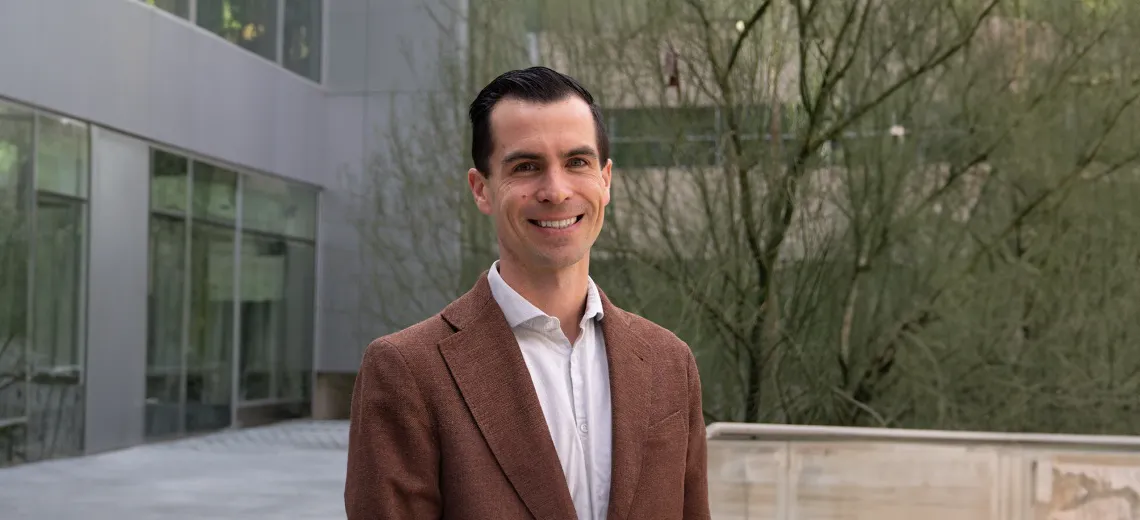Unlocking Finance Insights: Jason Sandvik Guides Students Through Emerging Trends

Jason Sandvik, assistant professor of finance at the Eller College of Management, was recently featured in a Research.com question-and-answer article answering students’ frequently asked questions about finance trends.
What are the most critical skills that finance students should focus on developing to succeed in the current job market?
It is crucial to have a very clear understanding of the "Time Value of Money," both conceptually and mathematically. For example, they need to know how to discount future cash flows to their present value. This is based on the principle that money today is worth more than the same amount of money in the future due to its potential earning capacity. Then, they need to be able to extrapolate this skill across a wide variety of question types, settings, and scenarios. Important applications include investment evaluation, financial planning, and asset valuation, among others.
What current trends in the finance industry should students be aware of and how can they leverage them?
Increasing one's technological skillset, be it with Excel, Python, R, Stata, SAS, etc. is quite important in a highly competitive field. Having more than one technological skill and the aptitude to develop skills across new technologies as they become relevant will set you apart and ensure many opportunities for research and employment. Programming skills and understanding how algorithms work are key to efficient and productive work and research.
What roles do internships and practical experience play in the education of a finance student, and how can students maximize these opportunities?
Internships can provide wonderful opportunities to develop new skills, be exposed to different types of jobs within the finance industry, and determine what one does (and doesn't) enjoy doing. For instance, interns can gain hands-on experience in areas such as financial analysis, investment banking, or risk management, allowing them to refine both their technical and interpersonal skills. Additionally, by engaging with professionals across different functions, interns can investigate a range of career options and pinpoint specializations that resonate with their interests. Ultimately, internships serve as a crucial platform for experimenting with different career paths, helping individuals make informed choices about their long-term professional aspirations.
What advice would you give to finance students about preparing for the transition from academia to the professional world?
You need to be able to communicate effectively. There will be a lot to learn when you move into your first job role, and you need to be able to communicate what you know and what you don't understand clearly and concisely. Mastering new skills and adapting to company culture will require time and effort. Effective communication is crucial for seeking clarification, understanding expectations, and building rapport with colleagues. Otherwise, you run the risk of feeling lost and confused and without a means of getting your questions answered. Misunderstandings can lead to errors, missed deadlines, and decreased job satisfaction. Therefore, developing strong communication skills from the outset is essential for professional growth and success.
How important is having a global perspective in finance, and in what ways can students gain international experience or insights?
A global perspective is important for many reasons, two of which are: (1) The global economy is very internationally intertwined. So, it's important to understand how events on the other side of the world can impact economic outcomes locally. For example, changes in interest rates in one country can impact currency exchange rates and influence global trade and investment flows. Supply chain disruptions in one region can also lead to shortages and price increases elsewhere. (2) With technology like Zoom/Teams making it increasingly easier to work remotely, the chance that one participates with a team of international coworkers has increased substantially. Because of this, it will be increasingly important for students to be comfortable and capable of working in highly diverse environments. Skills such as effective cross-cultural communication, adaptability, and awareness of different cultural norms will be crucial for building successful international professional relationships.
Other experts featured in the article are Andrew Karolyi, Cornell University, H. Kent Baker, American University, and Ekaterina Potemkina, Indiana University.
Prior to joining Eller in 2022, Sandvik earned his PhD in Finance from the University of Utah and worked at Tulane University. His research interests include empirical corporate finance, labor economics, and disclosure policy. His work has been published in top academic journals, including the Quarterly Journal of Economics, Management Science, the Journal of Accounting and Economics, and the Journal of Accounting Research. His work has been cited in major media outlets such as the Harvard Business Review, MIT Sloan Management Review, The Wall Street Journal, and Forbes.

